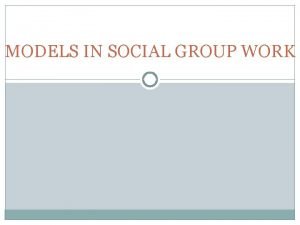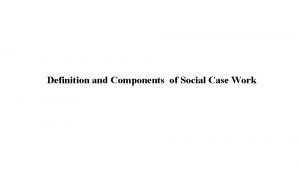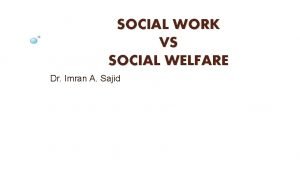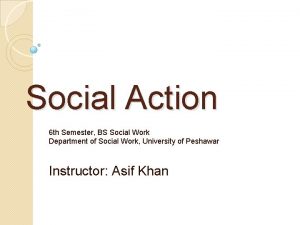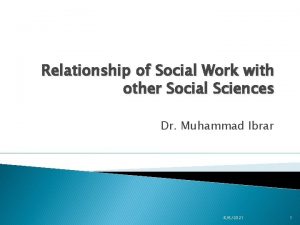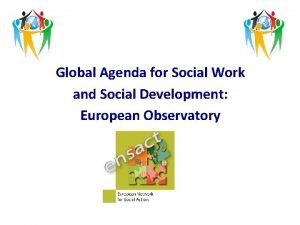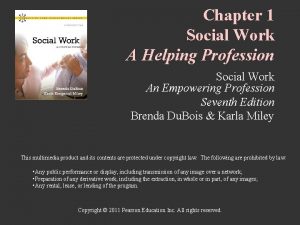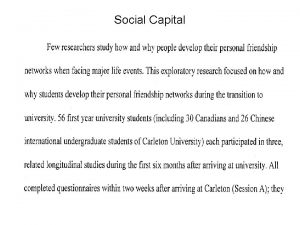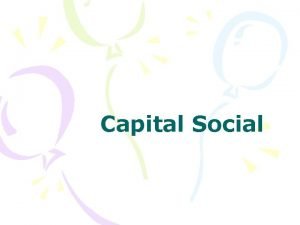Overview of the ONS Social Capital work so













- Slides: 13

Overview of the ONS Social Capital work so far Dr Veronique Siegler and Rachel O’Brien “Social capital is the glue that holds societies together and without which there can be no economic growth or human well-being” (World Bank, 1998).

Overview of presentation • Social Capital – brief history • Operationalising Social Capital: OECD and ONS work • ONS Social Capital Framework • Examples of measures • Why Social Capital is important • ONS Analysis of Social Capital • Ongoing ONS work on Social Capital • Other areas of work currently explored by the ONS

Social Capital – brief history High level of interest of social capital throughout 20 th Century. . but little agreement about the best way to define it or measure it Bourdieu: social capital is an individual’s access to personal networks Coleman: opened up social capital to a much wider range of applications, especially for family/education policy + role of community relationships World Bank: social capital definition includes institutions alongside networks and norms Putnam: social capital defined as networks of social engagement , trust and norms of reciprocity

Operationalising Social Capital: OECD and ONS work (1) 2001: OECD “networks together with shared norms, values and understandings that facilitate co-operation within or among groups” ONS (2001 -2003) • 1. 2. 3. 4. 5. UK Social capital Measurement Framework – 5 dimensions: Social networks and social support Social participation Civic participation Reciprocity and trust Views about local area • • • Social Capital Question Bank Development of a harmonised set of social capital questions Young people and social capital

Operationalising Social Capital: OECD and ONS work (2) § OECD (2013) “ Four interpretations of Social Capital: An Agenda for Measurement “ • ONS (July 2014) : Proposed framework and set of headline measures ØFramework based on OECD report and earlier work by ONS ØSelected headline measures for user feedback • ONS (July to November 2014) : User consultation Ø Framework and measures useful for policy makers ØPositive feedback on framework, some suggestions to include additional measures Outcome: 25 measures across 4 aspects (November 2014) ØSubjective/objective ØMostly at UK level ØBased on existing data sources (including Understanding Society, European of Quality of Life Survey (EQLS), European Social Survey (ESS))

Social Capital Framework – ONS, July 2014 FOUR DIFFERENT ASPECTS OF SOCIAL CAPITAL DEFINITION Personal Relationships Structure and nature of people’s personal relationships Social Network Support The level of resources or support that a person can draw from their personal relationships Civic Engagement The actions and behaviours that can be seen as contributing positively to the collective life of a community or society Trust and Cooperative Norms This refers to the trust and values such as solidarity, equity etc. . . that shape the way people behave towards each other and as members of society

Social Capital Framework – Examples of measures Aspects of Social Capital Examples of headline measures Personal • Those who meet socially with friends, relatives or work colleagues Relationships at least once a week • Those who regularly stop and talk with people in neighbourhood Social Network Support • Those who give special help to at least one sick, disabled or elderly person living or not living with them • Those who feel they have a spouse, family member or friend to rely on if they have a serious problem Civic Engagement • Those who have been volunteering in the last 12 months • Those who are members of organisations, whether political, voluntary, professional or recreational Trust and Cooperative Norms • Those who definitely agree or tend to agree that their local area is a place where people from different backgrounds get on well together • Those who would say that most people can be trusted

Why Social Capital is important • Social Capital is important for the well-being of individuals; communities; the nation. • Social Capital is important for the economy. • As part of their inquiry on well-being, the UK Parliament Environmental Audit Committee recognised that Social Capital is one the 3 pillars of sustainable development to be considered alongside natural capital and human capital, but that there is a need for better evidence and further in-depth research to better understand social capital.

ONS Analysis of Social Capital (1) • January 2015 : First baseline analysis of Social Capital in the UK Examples of results: • Around 1 in 10 people (11%) in the UK reported feeling lonely all, most, or more than half of the time (Source: European Quality of Life Survey, 2011/12). • A third of parents (32%) in the UK exchanged help (giving and receiving) with at least one of their grown-up children. Parents were more likely to give help than receive it (63% v 42%) (Source: Understanding Society, 2011/12). • Nearly three-quarters (71%) of people in the UK felt people in their neighbourhood are willing to help each other (Source: Understanding Society, 2011/12). • Just over a third (35%) of people in the UK reported that they would say that most people can be trusted (Understanding Society, 2009/10).

ONS Analysis of Social Capital (2) • July 2015: Inequalities in Social Capital by Age and Sex Examples of results : • Young people were the least likely to regularly stop and talk to their neighbours: less than half (45%) of those aged 18 to 24 regularly stopped and talked to their neighbours, compared to around 8 in 10 (83%) people aged 65 to 74 ( Source: Understanding Society, 2011/2012). • People aged 75 and over were the least likely to have at least one close friend; 11% of them reported having no close friend at all, compared to 2% of those aged 18 to 24 (Source; Understanding Society, 2011/2012). • Around 1 in 4 women (24%) and in 1 in 5 men (19%) aged 75 and over reported caring for someone sick, disabled or elderly within their household (Source: Understanding Society, 2012/2013).

Ongoing ONS work on Social Capital • ONS/CO Social Capital steering group; set up in July 2015 • ONS Contribution to the OECD Guidelines on the Measurement of Trust • Analysis of Social Capital by Region and Urban/Rural areas : to be published early 2016 • Ongoing dialogue with policy makers on use of the data Ø Social Capital relevant across a range of possible social and welfare policies. Ø Policy makers can consider how their policies affect the four dimensions of social capital, with a view to minimise negative impact and, if possible, delivering policies in a way that will enhance the dimensions of social capital

Other areas currently explored by the ONS • Whethere any gaps in measurement or other sources the ONS should explore and any suggestions for addressing them. • What are the main gaps in social capital analysis and priorities for analysis. It would be easier to make inferences, look at directions of causality, if all measures were from one source. • Whether an index of social capital (fewer numbers/single number) would be desirable.

Thank you for your attention! For more information, please contact: Veronique Siegler at: Veronique. Siegler@ons. gsi. gov. uk or Rachel O’Brien at: Rachel. O’Brien@ons. gsi. gov. uk All publications are available on: http: //www. ons. gov. uk/ons/guidemethod/user-guidance/social-capital-guide/index. html
 1 gram berapa ons
1 gram berapa ons Remedial goals model
Remedial goals model Components of case work
Components of case work Social welfare vs social work
Social welfare vs social work Scope of social action
Scope of social action Social work relationship with other social sciences
Social work relationship with other social sciences Global agenda for social work and social development
Global agenda for social work and social development Social work: an empowering profession 9th edition chapter 1
Social work: an empowering profession 9th edition chapter 1 What is gross working capital
What is gross working capital Difference between capital reserve and reserve capital
Difference between capital reserve and reserve capital Multinational capital structure
Multinational capital structure Difference between capital reserve and reserve capital
Difference between capital reserve and reserve capital Regulatory capital vs economic capital
Regulatory capital vs economic capital Regulatory capital vs economic capital
Regulatory capital vs economic capital

